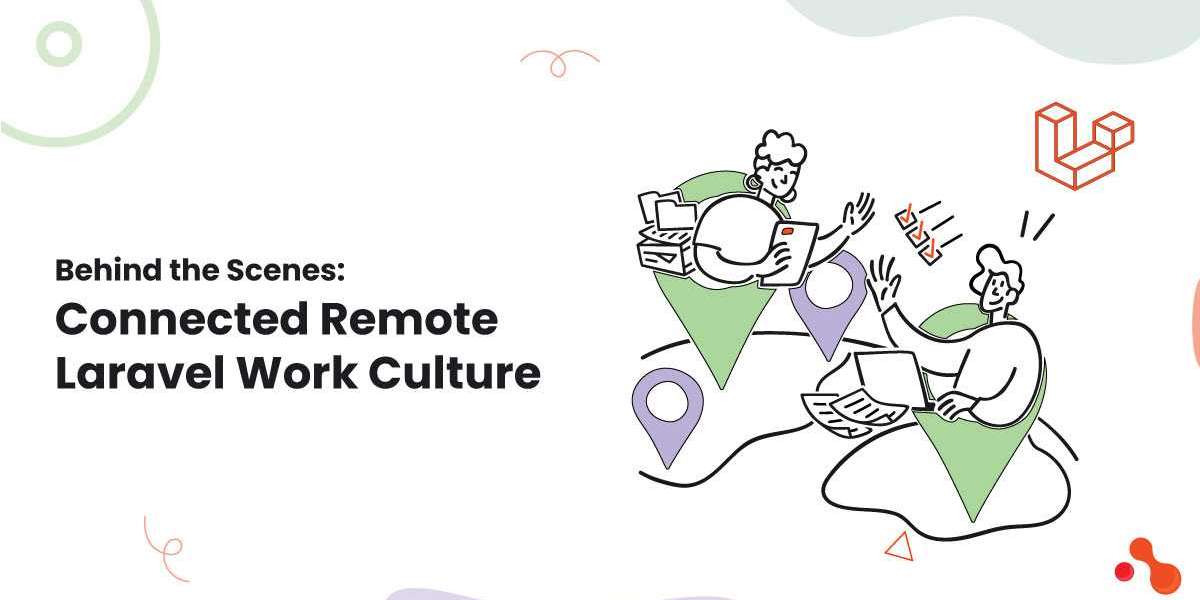Introduction
In the digital age, with the increased reliance on remote teams, it's no surprise that more businesses prefer to outsource their software requirements. Laravel work, being a popular choice for web development, often requires the collaboration of skilled developers, which many companies choose to manage remotely. While businesses may initially be concerned about their ability to manage remote teams, the real challenge lies in not only overseeing a remote team of Laravel developers but also ensuring that these teams remain highly connected, productive, and aligned with clear goals.
A well-connected remote Laravel team culture can make a significant difference in project outcomes, team satisfaction, and overall business success. Building a connected and productive remote Laravel team requires a deliberate effort to foster a strong team culture and ensure precise goal alignment.
It is crucial to establish practices that foster clear communication, goal alignment, and overall team synergy. This article explores comprehensive tips and strategies for fostering a connected remote Laravel team culture. It ensures better productivity, and achieving clear goal alignment within Laravel development teams.
Significance of a Connected Remote Team Culture
Connected team culture is vital in remote settings, where physical separation can lead to feelings of isolation, miscommunication, and a lack of engagement. This is true when you choose to outsource to a Laravel development company. Collaboration and communication are key to success in this case, as is maintaining a strong sense of connection.
There are many reasons why this is important:
Increased Productivity:
When team members feel connected, they are more motivated and collaborative, leading to higher productivity.
Clear Goal Alignment:
A connected culture ensures that everyone understands the project's goals and their role in achieving them.
Enhanced Innovation:
Connected teams are more likely to share ideas and innovations, leading to better problem-solving and project outcomes.
Employee Satisfaction and Retention:
A strong team culture reduces turnover and keeps morale high, which is crucial in the competitive tech industry.
Shared Standards:
When the team is connected, there is a shared understanding of quality standards, best practices, and project goals. This consistency ensures that the work produced meets or exceeds expectations.
Continuous Improvement:
A culture that encourages open communication and collaboration also promotes continuous improvement. Team members are more likely to share feedback and suggestions for improvement, leading to better overall performance.
Making the extra effort to improve remote work culture is the difference between simply getting the job done and delivering a top-notch solution that stands out. Transparency and clear expectations play a big role in developing the right culture with the remote team you outsource
Essential Tips
Establish Clear Communication Channels:
Communication is the backbone of any successful remote team. For Laravel developers, who often collaborate on complex projects, having clear and effective communication channels is essential.
Use the Right Tools:
Implement tools like Slack, Microsoft Teams, or Discord for daily communication and Zoom or Google Meet for video meetings. These tools should be integrated with your project management system to streamline communication and task management.
Set Communication Norms:
Define when and how team members should communicate. For instance, urgent issues might require a phone call, while regular updates can be shared via Slack.
Regular Check-Ins:
Schedule daily stand-ups or weekly check-ins to keep everyone on the same page. These meetings should be short and focused on updates, blockers, and immediate priorities.
Foster a Collaborative Environment:
Collaboration is key in Laravel development, where developers often work on interdependent tasks.
Collaborative Tools:
Utilize GitHub or GitLab for version control and ensure that everyone on the team is proficient in using these tools collaboratively.
Code Reviews:
Implement a structured code review process where team members review each other’s code. This ensures quality and encourages knowledge sharing.
Virtual Team Building:
Engage in virtual team-building activities to strengthen relationships and build trust among team members.
Align Goals with Team Objectives:
For a remote team to be productive, every member must understand and align with the team's objectives.
Clear Goal Setting:
Use frameworks like OKRs (Objectives and Key Results) to set clear, measurable goals for the team. Each developer should understand how their tasks contribute to the broader objectives.
Regular Progress Reviews:
Hold regular progress reviews to assess whether the team is on track to meet its goals. These reviews should involve the entire team and provide opportunities for adjustments if needed.
Transparency:
Maintain transparency in goal setting and progress tracking. Use project management tools like Jira or Asana to make sure everyone has visibility into project timelines and milestones.
Cultivate a Culture of Accountability:
Accountability ensures that team members take ownership of their tasks and deliverables, which is essential in a remote setting.
Set Clear Expectations:
Define clear expectations for each role within the Laravel team work, including deliverables, timelines, and quality standards.
Use Project Management Tools:
Leverage project management tools to assign tasks, set deadlines, and track progress. Tools like Trello, Jira, or Asana can help in monitoring accountability.
Regular Feedback:
Provide regular feedback to team members. This should be constructive and aimed at helping them improve their performance and meet expectations.
Celebrate Successes:
Recognition and celebration of achievements are crucial for maintaining morale and motivation in a remote team.
Celebrate Milestones:
Acknowledge both small and large milestones. This could be the completion of a sprint, the launch of a new feature, or a successful client deployment.
Virtual Team-Building Activities:
Organize virtual team-building activities to celebrate successes. This can include online games, virtual coffee breaks, or even a virtual awards ceremony.
Personalized Recognition:
Recognize individual contributions in team meetings or through a dedicated recognition channel in your communication tool.
Address Challenges Proactively:
Remote teams face unique challenges, from time zone differences to communication barriers. Proactively addressing these challenges can prevent them from disrupting the team's productivity and culture.
Time Zone Management:
Implement strategies to manage time zone differences, such as setting overlapping work hours so the team can collaborate in real time.
Cultural Sensitivity:
Be mindful of cultural differences within the team. Promote an inclusive environment where all team members feel respected and valued.
Conflict Resolution:
Establish clear protocols for resolving conflicts. Encourage open communication and provide a platform where team members can voice concerns without fear of retribution.
Technology and Tools:
The right tools can make or break a remote Laravel team's ability to stay connected and productive.
Communication Tools:
As mentioned earlier, tools like Slack, Zoom, and Microsoft Teams are essential for communication.
Project Management Tools:
Use tools like Jira, Trello, or Asana to manage tasks and keep the team aligned with project goals.
Development Tools:
Ensure that your team has access to the necessary development tools, such as PHPStorm, Visual Studio Code, Docker, and Laravel work Valet. These tools should be set up for remote access to enable seamless collaboration.
Security Tools:
To protect your remote development environment, implement security tools like VPNs, two-factor authentication (2FA), and secure code repositories.
Continuous Improvement:
A connected team culture is not built overnight; it requires continuous effort and adaptation.
Regular Retrospectives:
Hold regular retrospectives to evaluate what’s working well and what could be improved. Use these insights to make necessary adjustments to team practices.
Stay Updated on Best Practices:
Encourage the team to stay updated on the latest Laravel development practices and remote work trends. This can be done through webinars, online courses, or industry blogs.
Feedback Loops:
Create feedback loops where team members can provide input on how the team culture can be improved. This feedback should be taken seriously and used to drive positive changes.
Case Studies
Case Study 1: Enhancing Communication and Collaboration
Challenge: A remote Laravel development team was struggling with communication, leading to project delays and frustration among team members.
Solution: The team implemented a combination of Slack for real-time communication and Jira for task management. Daily stand-ups were introduced, along with a weekly retrospective meeting to discuss progress and challenges.
Outcome: The team saw a 30% improvement in project delivery timelines and reported higher satisfaction with the communication process. Pair programming helped junior developers learn faster, and the team became more cohesive overall.
Case Study 2: Aligning Goals with Team Objectives
Challenge: A remote Laravel team was unclear about the project’s overall goals, leading to misaligned efforts and duplicated work.
Solution: The team adopted the OKR (Objectives and Key Results) framework to set clear goals and track progress. Regular check-ins were held to ensure alignment, and transparency was maintained by sharing OKR progress in a shared document accessible to all team members.
Outcome: The team became more focused, with each member understanding how their work contributed to the broader project goals. The duplication of work was eliminated, and the project was delivered on time with high-quality results.
Elevate Productivity Achieve Goals
Creating a more connected remote team and striving for a healthy work culture is key to ensuring the success of your project. It is the right decision to hire Laravel developers by choosing to outsource your Laravel requirements. However, proactively creating a good working environment is also important to achieving your goals.
This means selecting the right software development outsourcing company. Acquaint Softtech is one such firm with over 10 years of experience. In fact, we are an official Laravel partner as well. Our team has the expertise to deliver next-generation solutions to help your business gain the upper edge.
Conclusion
By implementing these tips, you can create a remote Laravel team culture that not only supports productivity and goal alignment but also promotes a positive work environment conducive to growth and innovation.
Hire remote developers from a professional firm like Acquaint Softtech. We have the expertise to manage your Laravel project and deliver a next-generation solution.








